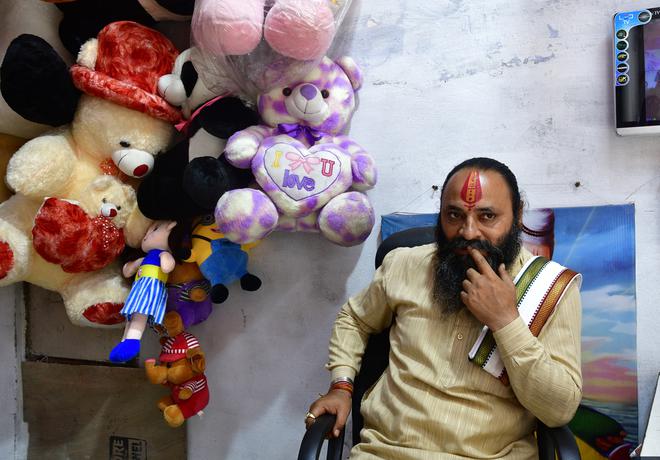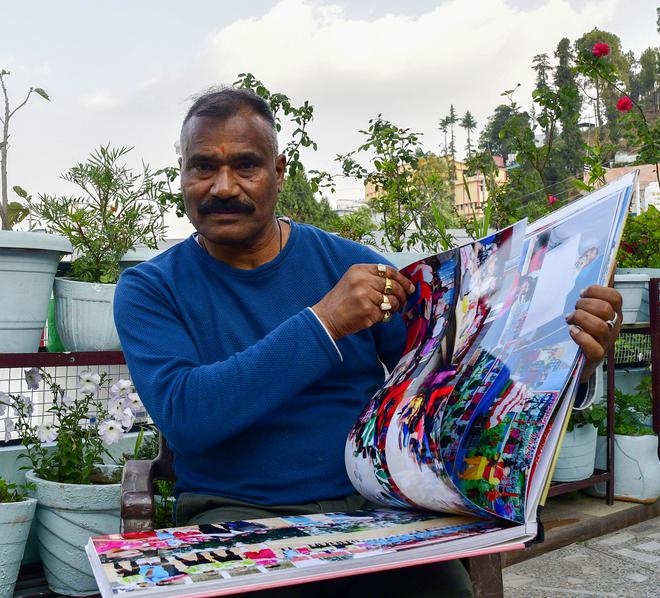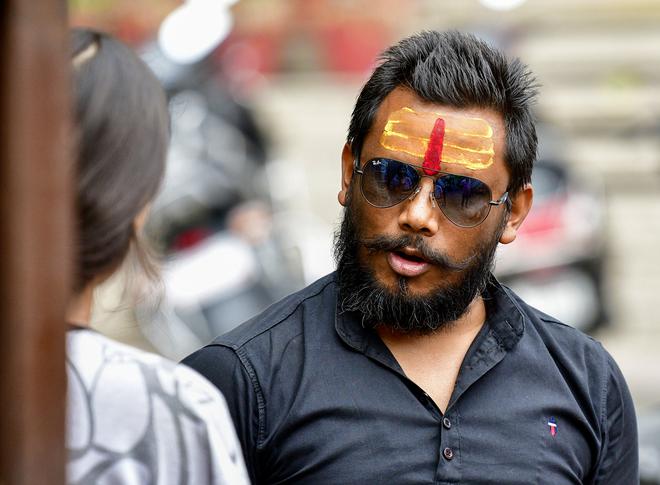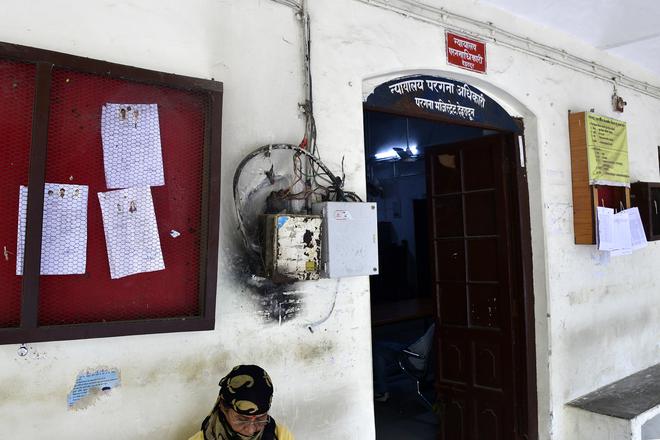In Little Angel Toys Shop in Paltan Bazar, Vikas Verma is trying to sell a pink unicorn to a customer. Some bargaining ensues for a few minutes in what is the busiest market in Dehradun, but Verma, who is the owner, refuses to relent. Then his phone beeps, and he looks at a WhatsApp message. Distracted, he agrees to the customer’s price, calling to his staff to take care of the shop. Moving to a corner, Verma fervently types a message to accompany a photograph of a notice pasted on the board of the Sub-Divisional Magistrate’s office.
“We have to find this girl,” says Verma, 44, who is the Bajrang Dal chief in Dehradun. In the notice are pictures of the couple — a Hindu woman and a Muslim man — who had applied to legalise their union under the Special Marriage Act, 1954. The recipients, all volunteers of the Bajrang Dal, are asked to relay the message to as many people as they can. The couple and their families must be identified, Verma urges, and the woman, who has “fallen into the trap of ‘love jihad’, must be ‘counselled’.”
The Special Marriage Act requires couples to submit a notice of intended marriage. According to Section 7 of the Act, objections to the marriage, if any, must be submitted within 30 days and in written form, which the Marriage Officer then records.
It is a lawyer from a District Court who has shared the information of the notice with Verma. Often, the information about interfaith couples who have registered to get married reaches Verma through WhatsApp messages via the ‘Bajrang Dal helpline’ numbers. Sometimes “vigilant people in society” are sources. On occasion, he receives anonymous letters.
“It’s not that easy, Didi,” Verma says. “These people [the couples] have become so clever these days that they have started writing wrong addresses in forms so that we cannot approach them. But we will do our best.”

Targeted by vigilante groups
Pinky and Rashid fell in love in Dehradun in 2019 and decided to get married. When they attempted to get their marriage registered at the local court, a few lawyers informed the Bajrang Dal.
Pinky’s parents were contacted by the vigilantes and a First Information Report (FIR) was filed against Rashid, a resident of Moradabad. He was booked under the Uttar Pradesh anti-conversion law, which was also passed by the Uttarakhand government. Both the States are governed by the Bharatiya Janata Party (BJP). Rashid remained in jail for a couple of weeks until a court released him, citing absence of proof of conversion and abduction, among other charges. During this time, Pinky, who was sent to a women’s care centre, suffered a miscarriage. Three years later, they are trying to live a normal life: Rashid goes to work every morning and Pinky takes care of their six-month-old twins.
Also read | For inter-caste, interfaith couples, a harrowing search for safe houses
It is not just middle-class couples like Pinky and Rashid who are the targets of attempts to “save” Hindu women from “falling into the trap of ‘love jihad”’. Economically and politically strong families are equally vulnerable, including those whose allegiance lies with the BJP.

Earlier this month, a BJP leader and the chief of Pauri Garhwal Nagar Palika, Yashpal Rawat alias ‘Benam’, cancelled the marriage of his daughter Monika with a Muslim man named Monish, as right-wing vigilantes objected to the union. When the wedding invitation went viral, vigilante groups organised a series of protests across the State. The former MLA, who refused to vacate his seat for veteran B.C. Khanduri, is now accused of celebrating his daughter’s wedding to garner votes from the minority community. “This is all a lie,” says Rawat to The Hindu. “I never objected to an interfaith marriage. How can people think like this in 21st century?”
Tit for tat
Verma, who is originally from Saharanpur in Uttar Pradesh, has been living in Uttarakhand for over two decades, and has been with the Bajrang Dal since 2010. A self-proclaimed swayamsevak, or member of the Rashtriya Swayamsevak Sangh, since childhood, he believes that the demography of Uttarakhand is changing rapidly, with large numbers of Muslims ‘encroaching’ on the land.
Sandeep Khatri, the founder of Devbhoomi Bhairav Vahini, another right-wing organisation, feels the same. Khatri claims his wife fell in love with him when she saw him staging a protest against Valentine’s Day. He and his team are keeping a tab on Sumati and Saad Alvi, a couple who got married earlier this year.

“We got to know about their ‘affair’ in 2017. Before he could make her convert to Islam, we made him change his religion. We made him drink cow urine and chant the Gayatri Mantra,” says Khatri, while showing the religion and name change advertisement that Saad gave to a local newspaper. Saad is now known as Shivansh.
The couple, who have changed multiple houses, did not want to be interviewed. They said they did not want any more controversy in their lives.
To counter ‘love jihad,’ young men, sometimes with the backing of religious organisations from the minority community too, have coined a term: ‘bhagwa trap’ (saffron trap). Their aim is to ‘save’ Muslim women from marrying Hindu men. They post warnings for women on social media, including videos of Muslim women who were allegedly killed by their Hindu partners. They distribute pamphlets in localities and deploy young men to “take care of women.”
Also read | Interfaith couples face harassment, threats and violence: Madhya Pradesh High Court
Deepanshu, an employee at a private company, says he was a target of their wrath. Deepanshu was thrashed by a group of Muslim men in Meerut on May 13, when he met two former Muslim colleagues.
“Some men approached me and my friends. We didn’t know them. They asked us how a hijab-clad Muslim woman can be friends with a Hindu man. And then they started beating the three of us,” he says, still in shock.
Editorial | Faith and marriage: On anti-conversion laws
An FIR was filed and the police arrested four or five people, identified in the videos circulated on social media.
In the last month alone, several cases of Hindu men being beaten in broad daylight for being accompanied by Muslim women were reported from Uttar Pradesh, Bihar, Maharashtra, Telangana, and other parts of the country. A man who runs an Instaram page, Stop_Bhagwa_love_trap, told The Hindu: “Apni ladkiyon ko bachana humara kaam hai (It’s our job to save our women).”
No faith in the system
Though the couples are being harassed by fringe elements from both communities, they are reluctant to go to the police. “In most cases, this is because their families will be defamed if there is a police complaint,” says Asif Iqbal, co-founder of Dhanak, a non-profit that works for people’s right to choose their partners, and against forced marriages and ‘honour’ killings. “In many cases, there is hope of reconciliation [with their families], and so these couples don’t go to the police.”
Iqbal says approaching the police ironically also invites a threat to security. “These fringe groups have people stationed everywhere. Couples don’t trust the system,” he says.

In most cases, the fringe groups get involved only when family members or relatives protest against the marriage, he adds. “In India, it is not the mother and father alone; even if aunts and uncles have a problem with the marriage, it becomes difficult to get married,” says Iqbal.
M.S. Pant, a lawyer, mostly handles cases filed against right-wing groups by the police. Pant claims that the police book right-wing members because they have a “grudge”. He also claims that FIRs are being lodged against right-wing groups because the BJP is in power.
Editorial | Freedom of religion is protected only when state keeps away from matters of faith, marriage
Pant maintains that the Bajrang Dal follows rules. The organisation never forces anyone, but only fulfils its moral duty that was assigned to it by the people themselves, he says. “My work is to save Hindu girls. I also save Muslim women. Many sisters come to me as they are harassed by triple talaq,” he says.
Leaking details
The Internet, particularly social media, is a useful tool for these groups. On May 23, photographs of marriage notices of interfaith couples from Telangana were splashed on Twitter by an anonymous account. A request for action accompanied these images: would a volunteer inform the family of the woman of this development? The intention was clear: to slam the brakes on the marital union.
The thread received many likes and retweets. Many also reported the handle. It went private, resurfaced after a few hours, and then altogether disappeared. The handle dismissed concerns about doxxing — revealing personal details of people online — of women, many of whom had Muslim names. Its defence was blunt: the data was available on the Telangana government’s Registration and Stamps Department (RSD) website.
The RSD’s ‘Notice Dashboard for Intended Marriages’ provides a drop-down. Users can select any of the State’s 33 districts and access details such as the name and photographs of the couple, the due date of raising objections, the application numbers, and even the present and permanent addresses. As on May 26, up to 588 marriage notices under Special Marriage Act were posted on the dashboard.
According to sources, this digital push came last year. To make processes simpler, photos of those intending to wed under the Special Marriage Act are taken at the Office of the Sub-Registrar. They are then uploaded on the dashboard.
A woman complained to the Hyderabad Cyber Crimes Police that a screenshot of her details was shared on Facebook along with her phone number. “The woman is from Hyderabad. We booked a case under Section 153A [promoting enmity between different groups on grounds of religion, race, place of birth, residence] of the Indian Penal Code today (May 25),” says K.V.M. Prasad, ACP, Hyderabad Cyber Crimes.
A day later, the police wrote to Facebook to trace the identity and whereabouts of the man who posted the information. “Once they respond, we will know the IP address and his phone number. We will proceed once we have this information,” Prasad says, adding that it was the first time such a case had come to their attention.
Over the past few days, screenshots from the RSD dashboard as shared on Twitter were circulating in WhatsApp groups, some of which The Hindu accessed. Much like the Twitter handle, calls to inform parents were made. One message read: “The marriage must be stopped. Faith does not permit it.” Appeals were made to share the information as widely as possible.
A senior officer associated with the RSD shows surprise that the data is readily accessible. “These are public documents. I have instructed the concerned officer to look into the issue which you have shared with me,” he says adding that presence of data online and its public access would be investigated and suitable action taken.
Lawyers say the Special Marriage Act requires a relook. An Allahabad High Court judgment held that publishing marriage notices on a board visible to all are optional, not mandatory, they say. A lawyer suggested that if a public interest litigation or writ petition is filed in the Telangana High Court, a similar order could be obtained.
Officials point out that vigilantes, irrespective of whether they are Hindu or Muslim, and whether well-networked or independent, used notices of marriage to meet their goals much before the advent of social media.
Social media experts say informal networks are created when pages such as Jhamunda, dedicated to moral policing and online vigilantism, encourage their followers to record and share video clips of young men and women from different communities together. “These pages have a huge following [in the thousands]. Videos are posted with descriptions in filthy language. Many of them have disappeared after the police began to notice them. To avoid being detected, they use super VPNs,” says a social media expert. Shikha Goel, Additional Director General of Police, Women Safety, Hyderabad, says four cases have been booked against Jhamunda since last year.
There is also spillover violence. A Muslim man recently waylaid a Hindu couple. The Musheerabad Police Station slapped a case against him . A similar incident was reported on May 12, under the Rein Bazar police station limits.
“My son was good friends with the girl,” says the father of a man who was waylaid. “He was stopped and assaulted by some Muslim men. I have Muslim, Christian, and Hindu friends. But the gulf between these communities has been increasing for the past few years. I want my son to get over the trauma and forget this incident.”







